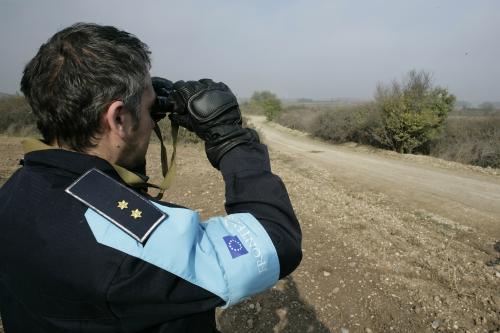New measures strengthening the European Border and Coast Guard to secure the EU’s borders were agreed by Parliament and Council negotiators, on Thursday.
The provisionally agreed changes to the European Border and Coast Guard Agency (Frontex) aim to remedy the current shortcomings and better respond to the present needs in security and migration.
Frontex was established in 2004 to improve the integrated management of the external borders. Two years ago, Frontex was expanded to become the European Border and Coast Guard Agency. During the migration crisis, the Agency’s operational needs to support frontline member states have quadrupled: from operations requiring the deployment of 52 359 worker-days in 2014 up to 189 705 worker-days in 2017.
A new standing corps of 10 000 staff to be set up by 2027
The negotiators agreed on setting up a new standing corps to support EU countries on the ground. The new corps could, at the request of a member state, carry out border control and return tasks as well as fight cross-border crime. It would also include a rapid reaction pool for rapid border interventions.
Starting with 5 000 operational staff in 2021, the standing corps would be fully operational by 2027 with 10 000 staff. Currently, the Agency relies solely on member states’ contributions.
“The European Border and Coast Guard law will overhaul Europe’s border management. It will mean an additional 10 000 border and coast guards for Europe; more efficient returns; more tools to fight crime and will serve to allay security and crime concerns and aid in our migration strategy. Europe’s citizens were looking to us to deliver and we have, in record time. This is a win for Europe,” said rapporteur Roberta Metsola (EPP, MT).
More efficient return procedures and cooperation with non-EU countries
The updated Agency would be able to support return procedures in member states, for example by identifying irregularly staying non-EU nationals and assisting national authorities in obtaining travel documents. The new rules would also strengthen the cooperation with the EU Asylum Agency.
EP and Council negotiators agreed that cooperation with non-EU countries needs to be strengthened. MEPs managed to introduce several safeguards to ensure respect for fundamental rights and protection of personal data is included in such cooperation.
Inter-parliamentary cooperation in the supervision of the Agency
To ensure effective scrutiny by the EP of the Agency and by the national parliaments of national authorities, the agreement introduces greater inter-parliamentary cooperation. The Agency’s management will be required also to attend joint meetings of the European and national parliaments.
The agreed text now needs to be formally approved by the Civil Liberties Committee, Parliament as a whole and the Council before entering into force.

